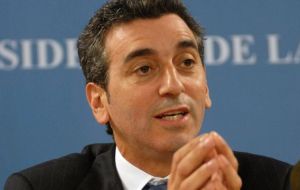MercoPress. South Atlantic News Agency
Argentine government tells Congress it will pay debts with reserves
 Interior minister Florencio Randazzo: some issues are “non negotiable
Interior minister Florencio Randazzo: some issues are “non negotiable Argentine government officials reiterated over the weekend that despite efforts from the opposition to stop the Government, it would service the public debt with the Central Bank foreign reserves.
Interior Minister Florencio Randazzo said “there are some issues that are not negotiable” and blasted the opposition for not begin supportive is such a delicate issue for Argentina.
“The opposition's proposals are completely different and clearly there's no intention to let us govern,” he accused, and explained that the Government hopes the opposition ”will listen to (Central bank nominee) Mercedes Marco del Pont in the Senate“ since she is ”ideal“ for her post, and added that if the opposition wants to bring calm to the population ”they will agree with her.“
”Rejecting her appointment is insane, so I ask the opposition to be responsible,” he pleaded. Ms Marco del Pont a close ally of President Cristina Kirchner and acting governor of the bank complied with and argued in favour of the urgency and need decree (DNU) tapping 6.6 billion US dollars in central bank reserves to pay debts.
Randazzo explained there's “no recollection in Congress of rejecting any appointment,” and “no DNU emergency decree has been revoked since their creation in 1994.”
He also challenged the opposition to introduce a bill that “honours the country's public debt at the lower cost possible”.
“If there's any bill that works just like the DNU emergency decree, let us hear it. If it honours the country's debt at the lower cost possible, we will stand by it” he declared adding that with the current instrument “we are saving one billion US dollars in higher interest rates” if Argentina was to appeal to global money markets for credit.
“For our international reserves we are being paid 0.5% but if we ask for credit globally we are going to have to pay 12 to 14% rate”, indicated Randazzo. “In politics, dialogue is essential but there must be willingness from both sides”.
In similar statements cabinet chief Anibal Fernandez said that the transfer of central bank reserves to the Treasury had been completed and “it’s over” and therefore there’s no going back even if Congress next week votes to have the funds returned to the central bank.
“All that has been acted on so far is absolutely legal and this includes the 6.5 billion USD transfer, through an Executive decree, to face maturing debts in 2010”, added Fernandez.
The Executive-Congress conflict in Argentina was born last December when President Cristina Kirchner created a special fund with 6.6 billion USD from the central bank to pay debts during 2010. Then bank governor Martin Perez Redrado refused point blank to comply, demanding congressional approval, and was finally sacked by the Kirchner administration.
However the institutional crisis erupted this week when Mrs Kirchner announced the annulment of the original decree which was replaced by another two, one of 2.187 billion USD to pay multilateral organizations and 4.382 billion to cancel debts with private creditors.
Funds were transferred on the same Monday to the Treasury but on Thursday a court injunction froze payments to private creditors. The opposition with majority in both houses prepares to vote this week the annulment of all urgency decrees.
Earlier in the day the head of the government caucus in the Lower House, Deputy Agustín Rossi assured that the government will most likely “accept to discuss the 2010 official budget if the opposition endorses the use of reserves to meet public debt payments.”
Rossi also remarked that “one must never lose the hopes; this whole situation must turn out positive. We'll see what happen in the short term.”
Like wise, Rossi insisted with a clear message to the anti-government caucuses “If the opposition accepts the use of foreign currency reserves, the government will have no inconvenient in to analyze the National 2010 Budget due to possible modifications.”
However he insisted on the convenience of the decrees signed by Mrs. Kirchner, “the new measures adopted by the president have impacted positively in the economy, hence I believe it would be a huge mistake to take them back”.




Top Comments
Disclaimer & comment rules-

Read all commentsPay The Debt Now!!
Mar 08th, 2010 - 09:14 am 0Commenting for this story is now closed.
If you have a Facebook account, become a fan and comment on our Facebook Page!